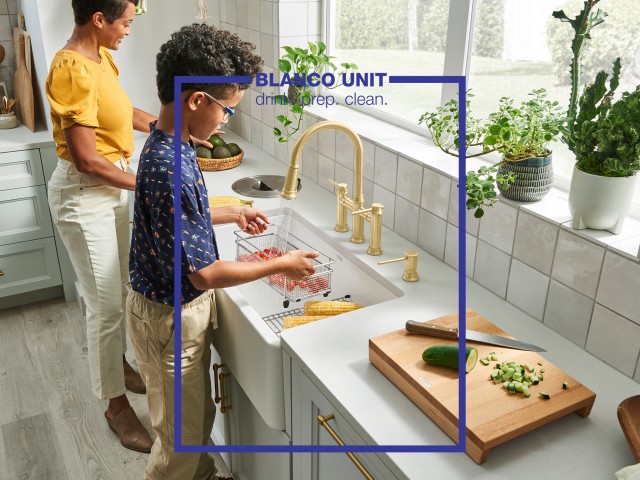Four Important Sink Design Considerations
Before you plunge into the water hub marketplace, take some time to think through a few key questions and considerations. Not only will the answers help guide your search, they may also impact other aspects of your renovation timeline.
Sink installation: How and where will your sink be installed?
Certain decisions and preferences may have a ripple effect that extends far beyond the sink area. We suggest thinking about sinks and faucets when you’re making all your major remodel design decisions, not just as an afterthought.
For example, if you decide you want an undermount sink installation, it’s important to inform your contractor early on so they can install the sink before the countertops. Also, carefully measure all the space around your sink area to ensure you pick elements that fit within the space. If you have cabinets over the sink, measure from the sink’s deck plate to the bottom of the upper cabinet to map out the ideal faucet height. You don’t want to wait until the plumber tries to install the faucet to figure out it’s too tall.
How do you use your sink? How is that working for you?
This is your chance to makeover, troubleshoot and solve anything that’s not working with your current sink setup, from minor hassles to major obstacles. Some common examples:
- How often have you started to wash or prep veggies in the sink, only to find it filled with dirty dishes? If you’ve faced this scenario, maybe it’s time to invest in a small prep sink for your kitchen island.
- Does your back or neck ache after spending time at the sink? You may not feel like you’re straining, but repetitive reaching and overextending can take a toll over time. Look for sinks that fit your stature better.
- If the counter and floor around your sink look like a splash zone, the problem could be a mismatched sink and faucet. A tall or “high-arc” faucet that ends 8-10 inches above the sink basin tends to propel water if paired with a shallow sink.
Consider Sink Sizes. Bigger isn’t always better.
An oversized sink may be perfect for some jobs, but a hindrance for others. Think about how you use your sink most often. If your sink space doubles as another prep area where you frequently wash and prepare vegetables or fill large pots with water, an oversized farmhouse sink is a great choice. If you’re simply looking for a sink to rinse glasses or plates that may be overkill. In that case, a smaller sink or a second sink that’s dedicated to quick tasks, like a bar sink, are ideal.
Consider your sink’s configuration. How many holes are in your sink or counter?
Most sinks come with one to several pre-drilled holes to accommodate a variety of faucet fixture configurations and “extras.” If your dream faucet set-up requires more holes than available, you’ll need to add holes to accommodate them...which is doable, but may require more planning if you’re working with an existing countertop.
/header-16x19-image-640w-853h.jpg)
/sink-16x19-image-640w-360h.jpg)
/faucet-16x19-image-640w-360h.jpg)
/512471-solon-401899-401876-ikon-33-farmhouse-wh-233530-406533-floating-grid-lifestyle-image-640w-360h.jpg)
